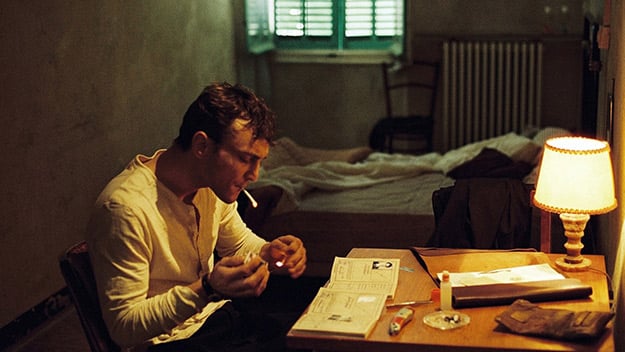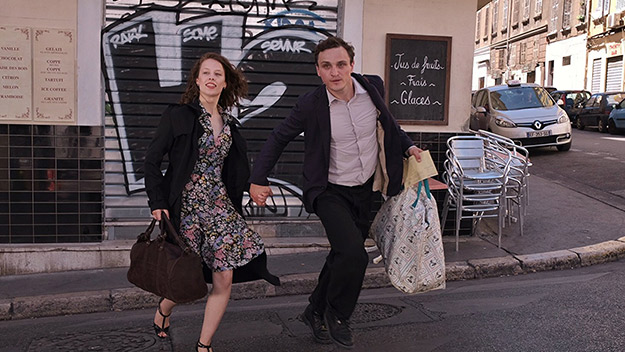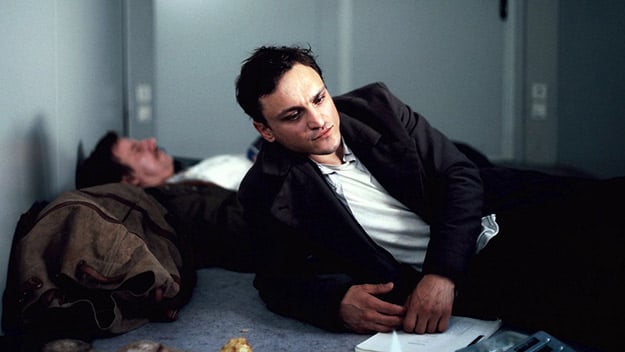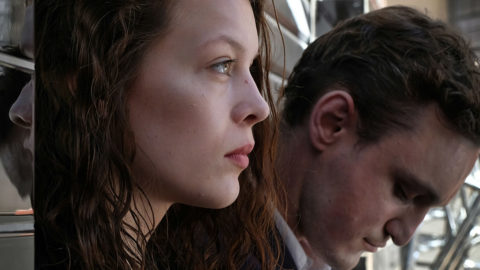Film of the Week: Transit

The films of German director Christian Petzold often depend on what you might call effects of misperception. They are “Schrödinger’s Cat” movies, which can’t easily be resolved into one alternative or another, but occupy a state of suspension between two mutually exclusive states of possibility. Yella (2007) exists precariously on a borderline between events actually happening and only hypothetically happening, between its protagonist being alive and dead. Period drama Phoenix (2014) is about a woman who returns from a concentration camp, her damaged face transformed by plastic surgery into a close approximation (we don’t know exactly how close) of her former appearance; although she’s recognized by people from her past as resembling herself, no one recognizes her as herself.
While the lushly stylized melodrama vein of Phoenix caused some viewers to resist its game-playing, the detached, austere follow-up Transit marks perhaps Petzold’s most daring, certainly his most cleanly conceptual use of such indeterminacy. Based on a 1942 novel by German writer Anna Seghers, Transit is set in France during World War Two, and follows its hero—a young German man who has escaped the camps—from Paris to Marseilles, in what was then Free France, just before the city was occupied. Georg (Franz Rogowski) is first seen in a Paris café, where he’s approached by a friend to deliver two letters to a writer named Weidel. But Weidel turns out to have killed himself, and Georg escapes to Marseilles in a goods lorry with a wounded man named Heinz. On arrival, Georg realizes that he can get himself on a ship across the Atlantic if he passes himself off as Weidel; but the writer’s wife Marie (Paula Beer) is haunting the streets and consulates of Marseilles, obsessively searching for the husband she had previously decided to leave. As Georg slips between his own and the dead man’s identities, it can only be a matter of time before his and Marie’s paths cross—although she mistakenly taps him on the shoulder almost the minute he hits town. Can it actually be that Georg so resembles Weidel from behind that Marie mistakes him more than once for her husband? That would be an outrageous coincidence—but Petzold’s films tend to thrive on coincidences, and on making us critically conscious of them.

The above is a simple account of Transit’s story. What makes things more complex is that the film is manifestly filmed in contemporary France, in modern dress—even though the Georg’s baggy suit could easily be of ’40s vintage. The French police we see don’t wear gendarmes’ kepis or the slouch hats of period cinema, but modern leather jackets or riot gear. Overt references are made to our own era: there’s mention of a zombie film, someone says, “Ah, cool!” in French, there’s a brief discussion of the Marseilles walkway designed in 2013 by Rudy Ricciotti. Sometimes, however, the reference points are blurred: Weidel’s hotel room contains not a MacBook, but an old-fashioned typewriter.
Transit is effectively two different films, depending on what you think you’re seeing. If you regard it as a story about World War Two manifestly filmed in the modern day, then you become increasingly conscious of the film as a film, as a fable recounted without historical set dressing. In this light, what we see is at once distanced and made more immediate. It’s more immediate because it refuses the period illusionism which might have made the film a genre exercise and therefore easy to disengage from. Conversely, Transit is distanced by being given the hard simplicity of a parable, of the demonstration of a theorem. Conventional identification, which Petzold famously despises, is blocked: we don’t have the luxury of investing emotionally in a tear-jerking melodrama. And yet the effect of this distance, as so often happens, is to enhance the emotion in a roundabout way, with feelings allowed to sneak in towards the end by narrative doorways where we might not have expected it to enter. In a story about transit, frontiers and the problems of passage, this becomes part of a complex rhetorical strategy.
That’s one possible account of Transit. But alternatively, it’s possible to see this literally as a story set in contemporary France, or at least a parallel version of contemporary France in which another occupation is taking place. It perhaps requires a more literal interpretation—or a more ingenious imagination—to read Transit consistently in these terms. But one thing that makes it possible is the presence of North African characters: a young boy named Driss (Lilien Batman), Heinz’s son, and his mother Melissa (Maryam Zaree). Ominous references to “spring cleaning” and these characters’ need to leave Marseilles evoke a world in which hostility toward Muslims places these characters in a situation at least potentially comparable to that of the Jews in ’40s France: in a Europe veering dangerously towards the far right, this version of Transit comes across as a warning that certain horrors of modern history could happen again.
The fascination of Transit is the way it keeps us uncertain what kind of film we’re watching, and uncertain of characters’ motives. Marie, whose dress and shoes give her the distinctively anachronistic touch of a ’40s movie heroine, offers at least two reasons why she’s looking for her husband. One is strictly self-serving (he still has the visa that will get her out of France), the others are to do with her unresolved relationship with him; meanwhile, she forms liaisons, of what emotional substance we can’t quite tell, with both Georg and Richard (Godehard Giese), a German doctor. It’s perhaps no coincidence, in a film about identities both borrowed and mistaken, that Richard bears a distinct resemblance to Jack Nicholson in Antonioni’s The Passenger, who wore a similar mustache at one point.

Also mysterious is the fact that Transit intermittently features a voiceover commentary by a German male who isn’t identified until late in the film but who might be the narrator of the Seghers novel: he provides a certain amount of exposition, but also places the film on a more detached literary footing, by virtue of his obtrusiveness. This is especially the case when playing with tenses: I can’t be certain how this works in the German, but judging from the subtitles, much of the narration uses the pluperfect tense (“He had looked at Marie once more…”), adding an extra layer of distance.
The film gives us the minimum of information about its characters. We know that Weidel is a writer, possibly with Communist beliefs; that’s about it. We assume Georg is Jewish, although the word is never mentioned; he knows how to use a solder iron to mend a radio, although we only have his word for it that that he’s a specialist in radio and TV repair. The characters we see are essentially functions: the hero desperate to survive; the mysterious woman he tangles with; the rival. Transit reminds us that the backstories with which characters are supposed to be equipped in conventional narratives, as guarantees that they possess a substantial self, are effectively papers of identity, allowing them to cross the border into our imaginations and sympathies. Figures without these essential documents do not normally qualify as full-fledged characters, so are normally discounted as insufficiently real. Transit, by contrast, demonstrates the flimsiness and falsity of identities built on such artificial premises.
Its characters are people without conventional identities or documentary proof of them, who constantly have to forge false selves with the hope of finding passage to some place of refuge. With their proof of identity exposed as superficial or fake, all they’re left with is the immediacy of their situation, the jeopardy they’re placed in as stateless people on transit—“stateless” in the sense of having no home, but also no substantial grounded condition in the world. In other words, they embody a classic definition of existential characters in existential situations.
Transit is what the characters dream of: in Marseilles, crowds wait at the Mexican and U.S. consulates day after day for the permits which will help them leave Europe. Yet ironically, a film with this title is about people locked in stasis: people are always too early or too late for the boats that would transport them, just as Marie, convinced her husband is in town, feels she’s always just too late to reach him. The film visually captures this strange becalmed state by constantly returning to the same spaces: the consulate offices, the café that Georg haunts, the housing estate where Driss and his mother Melissa live. Shot with an emphatic flatness by Petzold’s regular DP Hans Fromm, Marseilles is an elusive, unreal city: sometimes bustling with the activity of a concrete place, sometimes almost silent, near-deserted, a ghost town occupied by ghosts, or people who are soon to become them.

Transit is indeed a ghost story of sorts, of possession and haunting, but is Georg possessed by the dead Weidel, or by impersonating him, is he the ghoul invading the dead man’s body? Georg remains enigmatic, seemingly an opportunist only out for survival, but increasingly drawn to the possibility that his fate might be to help others, whether it’s Marie or Driss, the boy who gravitates to him as a surrogate father. As Georg, Franz Rogowski (one of the gang in Sebastian Schipper’s Victoria) is an unsettling presence, at once menacing and vulnerable, a tough guy and a soft-spoken tender soul, with a look of Peter Lorre as a pugilist, but seemingly ever-ready to vanish into the folds of his baggy suit.
Perhaps the most perplexing element of Transit is Paula Beer, from François Ozon’s Frantz. Transit is Petzold’s first film since 2005’s Ghosts not to feature his regular female lead Nina Hoss, but it’s uncanny how Beer has been made to resemble Hoss here: she has the same haggard sleepless look about her eyes, and seemingly wet hair, as if she’d crawled out of the same river that Hoss’s heroine did in Yella. Beer appears to be playing a variant on the same archetype—the woman escaped from a nightmare, and trying to survive in the waking world. She is a very different actress, though, embodying a much more fragile desperation, rather than the hard-bitten tenacity of Hoss’s heroines, who seem worn down to an irreducible core; that fragility gives Beer’s Marie the quality of a woman drifting with the wind, clinging for dear life to whatever other wreckage drifts her way.
The story ends, as so Petzold’s films tend to, with a series of bitterly ironic reversals. Transit is perhaps his most mysterious film, certainly one of his more austere and challenging works. And because of its thoroughgoing dismantling of illusion, it’s perhaps his oeuvre’s starkest instance of pure storytelling. It’s set in a port, after all—and as a character points out, “Ports are places where stories are told.”
Transit is now playing at the Film Society of Lincoln Center.
Jonathan Romney is a contributing editor to Film Comment and writes its Film of the Week column. He is a member of the London Film Critics Circle.





